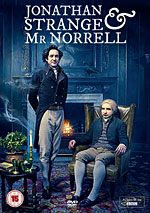Jonathan Strange & Mr Norrell: Jonathan Strange & Mr Norrell Show Only
June 28, 2015 1:31 PM - Season 1, Episode 7 - Subscribe
With England in chaos as magic returns, Strange comes back home to claim Mr Norrell and rescue Arabella. But can his plan possibly work? Or will the dark prophecy of the Raven King finally be fulfilled?
Now that this play in seven acts has ended, my dear friend may wish to revisit the milieu of these times and personages represented herein, august or otherwise. While there may be lifelike, exacting accounts of the play bound radiantly in blue, for a lady to bring into her parlor, or a seeming torrent of less-exacting but still representational printings of the play’s text for the traveling gentleman, this humble scribbler urges one and all to lay their hands and their eyes on a copy of the novel, Jonathan Strange & Mr Norrell, published by Bloomsbury Press, London,* as well as its companion volume, The Ladies of Grace Adieu and Other Stories.
Miss Clarke’s novel and collection of tales have a number of intriguing and edifying points to make. Our recent entertainment had many elisions and omissions so that it might be played in a reasonable amount of time in our Globe. Put simply, the books, though they may be novels and tales, are but Truth, which is naturally so acceptable to Man, so charming in Herself.
Who is the other lady who loved Stephen Black? What was the name of the Pharisee who took away the maid’s flax to spin? Who was Sir Walter’s particular friend? What was remarkable about Mary, Queen of Scots’s petticoats? How did the Cumbrian charcoal burner fare in his dispute against His Majesty the King of Northern England, John Uskglass? The answer to these questions and more yet unasked lie between the covers of Bloomsbury’s edition of Jonathan Strange & Mr Norrell, as well as their edition of The Ladies of Grace Adieu and Other Stories.
* Contrary to their reputation among readers of books about magic, Bloomsbury Press are not a traditional concern, but a rather new press founded only a score of years preceding by Mr Newton. Mr Newton made his reputation soon after by publishing a short novel about young pupils of magic attending a public school for magicians in the North. This novel sold so well that Mr Newton and the author, styled J K Rowling, proceeded with publication of another six novels, one for each year of study; and each sold very well indeed.
Now that this play in seven acts has ended, my dear friend may wish to revisit the milieu of these times and personages represented herein, august or otherwise. While there may be lifelike, exacting accounts of the play bound radiantly in blue, for a lady to bring into her parlor, or a seeming torrent of less-exacting but still representational printings of the play’s text for the traveling gentleman, this humble scribbler urges one and all to lay their hands and their eyes on a copy of the novel, Jonathan Strange & Mr Norrell, published by Bloomsbury Press, London,* as well as its companion volume, The Ladies of Grace Adieu and Other Stories.
Miss Clarke’s novel and collection of tales have a number of intriguing and edifying points to make. Our recent entertainment had many elisions and omissions so that it might be played in a reasonable amount of time in our Globe. Put simply, the books, though they may be novels and tales, are but Truth, which is naturally so acceptable to Man, so charming in Herself.
Who is the other lady who loved Stephen Black? What was the name of the Pharisee who took away the maid’s flax to spin? Who was Sir Walter’s particular friend? What was remarkable about Mary, Queen of Scots’s petticoats? How did the Cumbrian charcoal burner fare in his dispute against His Majesty the King of Northern England, John Uskglass? The answer to these questions and more yet unasked lie between the covers of Bloomsbury’s edition of Jonathan Strange & Mr Norrell, as well as their edition of The Ladies of Grace Adieu and Other Stories.
* Contrary to their reputation among readers of books about magic, Bloomsbury Press are not a traditional concern, but a rather new press founded only a score of years preceding by Mr Newton. Mr Newton made his reputation soon after by publishing a short novel about young pupils of magic attending a public school for magicians in the North. This novel sold so well that Mr Newton and the author, styled J K Rowling, proceeded with publication of another six novels, one for each year of study; and each sold very well indeed.
« Previous Episode
You are not logged in, either login or create an account to post comments
